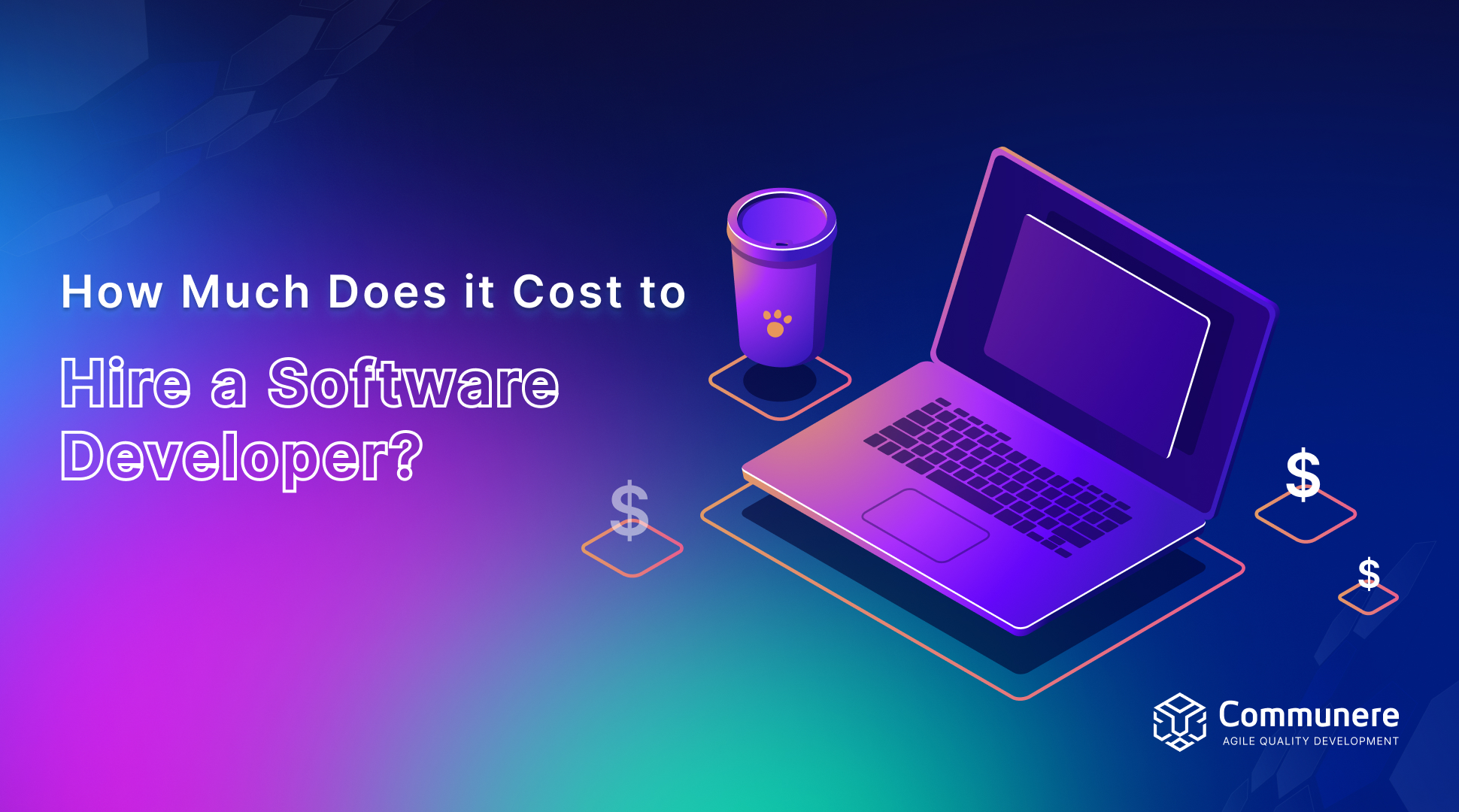Hiring a software developer is a critical investment for any business, and understanding the cost components involved is crucial for budgeting and making informed decisions. Perhaps the main questions a decision maker might have at the early stages are, “How much does a software developer cost?” or “What affects the salary of a software developer?”. This guide aims to provide accurate answers to these and similar questions. We’ll break down the core cost components of hiring a software developer, providing insights into base salary, benefits and perks, taxes and employer contributions, recruitment and onboarding, tools, software, licenses, and office space and equipment (if applicable).
Table of Contents
- How Much Does It Cost To Hire A Software Developer? [The Core Cost Components]
- Additional Costs and Considerations
- Freelancer vs. Full-time Software Developer: Cost Comparison
- Hidden Costs and Budgeting Tips
- Freelancer vs. Full-time Software Developer; Which is Better?
- How Much Does A Software Developer Cost: The Conclusion
How Much Does It Cost To Hire A Software Developer? [The Core Cost Components]
According to Talent.com, in the United Kingdom, the typical annual salary for a software developer is £42,500, which equates to an hourly rate of £21.79. Entry-level roles usually commence at £35,000 annually, whereas seasoned professionals earn as much as £60,000 annually.
You should consult recent job listings, industry reports, salary surveys specific to your region and industry or consult with a software development company for the most accurate and up-to-date information. Remember that the job market is subject to change, and verifying salary information with current, reliable sources is advisable.
Feel free to contact us if you want precise information on the costs of hiring a software engineer in the UK. We at Communere specialise in assembling dedicated software development teams for clients and allowing them to maintain complete control over their team while paying less compared to regular salaries and rates in the UK. Give us a call, send us an email, or chat with us to discover how it works.
The cost of hiring a software developer can vary widely based on many factors. It’s important to note that providing an exact figure is impossible due to the dynamic nature of the job market, regional differences, and individual qualifications. Below are some of the most important factors to consider.
1. Base Salary
Base salary refers to a software developer’s fixed compensation for their work. Several factors influence the base salary:
- Experience:
More experienced developers typically command higher salaries due to their expertise and ability to tackle complex projects efficiently. According to the Stack Overflow Developer Survey 2021, developers with 10+ years of experience earn significantly more than those with fewer years of experience [source: Stack Overflow Developer Survey 2021].
- Location:
The geographical location of the job plays a pivotal role in determining the base salary. Developers in high-cost-of-living areas tend to receive higher salaries to compensate for the increased expenses. For instance, a software developer in London might command a higher base salary than one in a smaller town.
- Technology Stack:
Developers proficient in specialised or in-demand technologies, such as AI/ML, blockchain, or cybersecurity, often command higher salaries due to their niche expertise. This can vary widely depending on the specific technologies that are in demand in the job market.
2. Benefits and Perks
Benefits and perks contribute significantly to the overall cost of hiring a software developer. These can include:
- Health Insurance:
Employers typically provide health insurance as part of the benefits package. The cost of the premium varies based on the coverage and the company’s contribution. According to the Bureau of Labor Statistics, as of 2020, the average cost of providing health insurance for an employee was approximately $7,470 per year [source: BLS].
- Retirement Plans:
Contributions to retirement plans, such as 401(k)s, are crucial for many developers. Employers may match a percentage of the employee’s contributions. The average employer 401(k) match in the United States is around 4.7% of the employee’s salary [source: Vanguard’s How America Saves 2020 report].
- Paid Time Off:
This includes vacation days, sick leave, and holidays. The cost of paid time off depends on the company’s policies and the number of days allocated.
3. Taxes and Employer Contributions
Contributions to retirement plans, such as 401(k)s, are crucial for many developers. Employers may match a percentage of the employee’s contributions.
The average employer 401(k) match in the United States is around 4.7% of the employee’s salary [source: Vanguard’s How America Saves 2020 report].
- Paid Time Off:
This includes vacation days, sick leave, and holidays. The cost of paid time off depends on the company’s policies and the number of days allocated.
- Social Security and Medicare:
Employers are responsible for paying half of the Social Security and Medicare taxes, which comprise 7.65% of the employee’s earnings. For instance, if a developer has an annual salary of $80,000, the employer would contribute around $6,120 towards these taxes.
- Other Contributions:
This encompasses contributions towards state unemployment insurance, worker’s compensation, and other state-mandated employer taxes and benefits.
Additional Costs and Considerations
Understanding the core cost components of hiring a software developer is essential for making informed decisions about recruitment and budgeting. Businesses can accurately estimate the total cost of bringing a developer on board by considering factors like base salary, benefits and perks, taxes and employer contributions, recruitment and onboarding, tools, software, and licenses, as well as office space and equipment.
Remember that these costs may vary depending on specific circumstances, making it crucial to conduct thorough research and consult with industry experts when hiring.
Recruitment and Onboarding
Pay attention to expenses related to the hiring process. Posting on job boards, professional networks, and social media platforms incurs costs. If you opt for external help, be prepared for agency fees, typically a percentage of the developer’s first-year salary. In addition, include costs associated with onboarding and training a new developer, including orientation materials, training programs, and mentorship.
Tools, Software, and Licences
List essential tools and software a developer may need, including Integrated Development Environments (IDEs), version control systems, project management tools, etc. Also, estimate the costs associated with licensing and subscriptions for software and tools, both proprietary and open-source.
Office Space and Equipment (if applicable)
- Office Space Rental:
Office space rental affects costs, including lease agreements, utilities, maintenance, and furnishings.
- Equipment Provision:
Include costs for providing hardware like computers, monitors, peripherals, and furniture.
- Remote Work Considerations:
Some associated costs for remote developers include stipends for home office setup, software licenses, and virtual collaboration tools.
Freelancer vs. Full-time Software Developer: Cost Comparison
A critical decision for most businesses is hiring a freelancer or a full-time developer. This choice hinges on numerous factors, cost being a pivotal one. Let’s delve into a comprehensive comparison to help you make an informed decision.
Freelancer Rates and Considerations
Freelancer rates vary widely based on expertise, location, and project complexity. On average, freelance developers charge between £30 to £100 per hour, with experienced specialists demanding higher rates. Project-based rates can range from a few hundred to several thousand pounds, depending on scope.
Advantages
- Flexibility: Employing freelancers allows for on-demand access to specific skills without the commitment of a long-term contract.
- Reduced Overheads: Freelancers typically operate independently, meaning businesses save on expenses like office space, equipment, and benefits.
- Specialised Expertise: Freelancers often possess niche skills and extensive experience in particular technologies or industries.
Disadvantages
- Lack of Integration: Freelancers may need to be more deeply integrated into the company culture or processes, potentially leading to communication gaps.
- Limited Availability: Availability can be a concern, especially for high-demand freelancers or during peak work periods.
- Potential Quality Variability: While many freelancers are highly skilled, there can be a broader spectrum of quality compared to full-time employees.
Full-time Employee Costs
- Comprehensive Expenses
Hiring a full-time developer encompasses various costs beyond their salary. These include benefits (healthcare, retirement plans), taxes, training, and office space.
- Benefits and Taxes
Employers often allocate approximately 20-30% of a full-time employee’s salary to cover benefits, including health insurance, retirement contributions, and paid leave. Additionally, employers are responsible for payroll taxes ranging from 8-12% of the employee’s salary.
- Office Space and Equipment
Full-time employees necessitate physical office space, a workstation, and related amenities, which can substantially augment the overall cost.
Hidden Costs and Budgeting Tips
Unforeseen Expenses
- Sick Days and Leave: Full-time employees are entitled to paid leave, which should be factored into the overall cost.
- Training and Certifications: Ongoing professional development and certifications are essential in the tech industry and can incur additional expenses.
Budgeting Tips for Efficient Hiring
- Project Planning: Clearly define the project’s scope to estimate costs and timelines accurately.
- Utilise Interns or Junior Developers: Consider supplementing your team with interns or junior developers who can offer cost-effective solutions.
Long-term Cost Considerations
Over time, full-time employees can incur increased expenses due to salary raises, promotions, and additional benefits. This must be taken into account for long-term financial planning.
Freelancer vs. Full-time Software Developer; Which is Better?
In weighing the options between hiring a freelancer and bringing on a full-time software developer, it’s evident that each choice comes with its own set of costs and benefits. Freelancers offer flexibility and specialised expertise, often at competitive rates, making them an attractive option for short-term or project-based needs. However, integration challenges and potential variability in quality may arise.
On the other hand, full-time employees bring stability, long-term commitment, and the potential for cost savings over time. While they entail higher upfront expenses, they offer deeper integration into company culture and processes. Additionally, full-time employees contribute to a stronger sense of team cohesion and continuity.
How Much Does A Software Developer Cost: The Conclusion
Understanding the cost components of hiring a software developer is essential for businesses seeking to build a proficient development team. We’ve examined vital factors such as base salary, benefits and perks, taxes and employer contributions, recruitment and onboarding, tools, software, licences, and office space and equipment. It’s important to note that costs can vary based on factors like experience, location, and technology stack.
Whether you’re considering a freelancer or a full-time employee, each option has its own set of costs and benefits. Freelancers offer flexibility and specialised expertise, while full-time employees provide stability and long-term commitment.
Remember to factor in hidden costs like sick leave, training, and certifications as you embark on hiring. Additionally, consider long-term financial planning for full-time employees, considering potential salary raises and additional benefits.
Carefully evaluating these costs ensures a strategic and sustainable approach to building your development team. Reach out to industry experts and conduct thorough research to make informed decisions. Consider consulting with software companies like Communere if you seek a cost-effective solution. We specialise in assembling dedicated software development teams, allowing you to maintain control while saving on costs compared to regular salaries and rates.
Don’t hesitate to contact us for precise information on hiring a software engineer in the UK. We’re here to support you in making the best choices for your development needs. Happy hiring 🙂
Sources:




![Why Custom Web Development is the Best Approach [2024]](https://resources.communere.com/wp-content/uploads/2024/02/Why-Custom-Web-Development-is-the-Best-Approach-1024x570.jpg)

